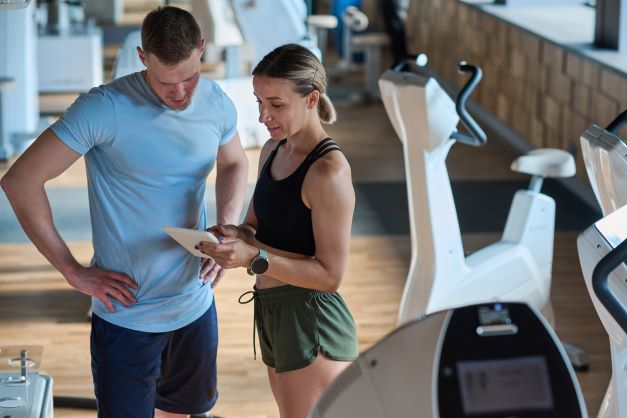The tools and resources to make long-term lifestyle adjustments are available in Healthy Lifestyle Programs. They cover a wide range of health topics such as nutrition, exercise, and mental well-being.
Our program is based on the WHO’s Health Promoting School framework which advocates a holistic, settings-based approach to health promotion and prevention [15]. It takes a relational approach to changing behaviour, building relationships with the school, child and family to create supportive environments for healthy lifestyle choices.
What are they?
Programs for healthy lifestyles are designed to help people develop habits that will improve their long-term health. They include weight management, nutrition and exercise, stress management, mental health and more.
Samaritan’s experts in health and fitness offer a comprehensive approach for chronic disease prevention and treatment. This includes education, behavior therapy, and exercise. All programs are monitored by a physician and offered in both a group and individual setting.
The Healthy Lifestyle Program is a free service for adults with diabetes or obesity who want to learn how to make positive changes in their diet, exercise and lifestyle habits. It combines physician-led sessions with one on-one coaching and support by a dietitian or exercise specialist.
Participants receive a personalized meal plan, and work with the dietitian to improve their eating behaviors and physical activity levels. They also attend group sessions to share their experiences and progress with other participants.
You must be referred by your primary care provider to enroll in the Healthy Lifestyle Program. Your medical history will first be reviewed and a physical examination may be performed. Your doctor will refer you to one of our registered dietitians or an exercise specialist if you meet the eligibility requirements.
UT employees and faculty can participate in an evidence-based 6-week program to encourage healthy lifestyles through physical activity, proper nutrition and healthy habits. The program is based on the CDC’s Diabetes Prevention Program and uses lunch and learn style sessions to teach participants about current recommendations and to set goals for achieving healthy behaviors.
There are many community resources that can also be used to promote healthy lifestyles at schools and other educational environments. These include HealthierUS Schools Challenge, National Dairy Council, and Fuel Up to Play 60. Teachers, parents, and school leaders can benefit from in-school programs such as Together Counts or Parent Leadership Series.

What do they offer?
Programs that promote healthy lifestyles are a great way of making your health a priority. They can help you to adopt healthy lifestyle habits such as exercising and eating right.
A good program can include a comprehensive wellness assessment, educational materials and tools, an exercise class and a well-deserved spa treatment. The best programs will keep you focused and engaged, so it is more than a one-off event.
A health and fitness program can help you improve your well-being, productivity, and quality of your life. It can be challenging to find a program that meets all your needs and has the right ingredients for success, so take advantage of the many options available to you. Some of the most effective programs are provided by your employer or through a health insurance provider, which can be a convenient way to stay on track with your healthy lifestyle. Some programs offer financial incentives and other perks that can make it even more enjoyable. The best programs also have an expert-approved curriculum and a lifestyle coach that can help you achieve your goals in the shortest time possible.
Who can participate?
Aside from gaining knowledge on healthy eating and physical activity, participating in a healthy lifestyle program can also help you feel supported throughout the journey. These programs provide live coaching and education with a qualified health professional, who can help you stay motivated and on track. These programs empower moms and teens to be their best friend, make positive lifestyle changes that will help them become happier and more confident.
We used data from a 2004 biennial survey to understand the relationship between participation in a WHP Program and indicators of lifestyle-related behaviour and health. The study focused on a WHP program that was launched in Western Sweden in 2005 between a large Swedish manufacturer and a public hospital.
The project was meant to be inclusive of all workers, rather than targeting at-risk segments. During the course of the study, a total of 65,000 employees participated in the project. The majority of participants had never been exposed to WHP programmes before. While many of the participants had a history of poor lifestyle-related health, they all were able to make positive change over the course of the study.
How do they work?
Healthy lifestyle refers to a way of living that includes diet, exercise, and mental health. These can help you feel better, improve your health, reduce your risk of disease, save you money and even benefit the environment.
Many people refer to healthy lifestyles as they are meant to encourage people to make lifestyle changes that can improve their lives and lead to a longer, healthier life. They usually use some sort of financial incentive, such as discounts on health insurance or gym memberships, to persuade people to take part. Some workplaces have their own health promotion programs, but others partner with a health company to develop a program that they can offer to their employees and clients.
To get started, a physician will review your medical history and perform a physical examination. The doctor will also evaluate your readiness to make changes. A physician may refer you for a consultation with a dietitian, or an exercise specialist. During this consultation, you will learn how you can make the necessary lifestyle and diet changes.
Once you are enrolled in this program, a dietitian/exercise specialist will work with your to create a customized meal plan and schedule you for your exercises. They will also provide you with support and encouragement throughout the process. You will continue to receive follow-up visits until you reach your goal. You will develop healthy habits that you can carry on even after you have completed the program. The dietitian will also give you tips for shopping and meal planning if you are trying to lose weight.
